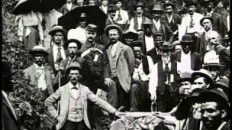The First Great Awakening (sometimes Great Awakening) or the Evangelical Revival was a series of Christian revivals that swept Britain and its Thirteen Colonies between the 1730s and 1740s. The revival movement permanently affected Protestantism as adherents strove to renew individual piety and religious devotion. The Great Awakening marked the emergence of Anglo-American evangelicalism as a transdenominational movement within the Protestant churches. In the United States, the term Great Awakening is most often used, while in the United Kingdom, it is referred to as the Evangelical Revival.
Building on the foundations of older traditions—Puritanism, pietism and Presbyterianism—major leaders of the revival such as George Whitefield, John Wesley and Jonathan Edwards articulated a theology of revival and salvation that transcended denominational boundaries and helped create a common evangelical identity. Revivalists added to the doctrinal imperatives of Reformation Protestantism an emphasis on providential outpourings of the Holy Spirit. Extemporaneous preaching gave listeners a sense of deep personal conviction of their need of salvation by Jesus Christ and fostered introspection and commitment to a new standard of personal morality. Revival theology stressed that religious conversion was not only intellectual assent to correct Christian doctrine but had to be a “new birth” experienced in the heart. Revivalists also taught that receiving assurance of salvation was a normal expectation in the Christian life.
























